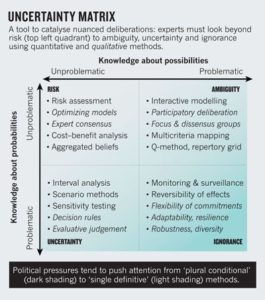18 July 2019: The Politics of Uncertainty Symposium
The Politics of Uncertainty – Practical Challenges for Transformative Action was an international symposium held by the STEPS Centre at the University of Sussex in Brighton from July 3-5 2019.
The aim of this symposium was to bring together people working in different domains (including finance, environment, migration, disease, innovation, infrastructure, security) to explore the diverse ways uncertainty is understood and responded to in their respective fields. This was done to develop richer and more nuanced understandings of uncertainty to help enable more robust actions, strategies and governance in times of instability and change.
NAMMCO Scientific Secretary Fern Wickson was invited to participate in the symposium and gave a short talk on ambiguity as a form of uncertainty in environmental governance. She spoke about the important ways ambiguity manifests in the science, philosophy and politics of environmental harm. This includes the way diverse values can shape understandings of what constitutes environmental harm, how diverse frames and assumptions can shape the scientific research done to understand environmental harm, and the way various interests and available options can shape management decisions to minimise environmental harm. She also emphasised how those working within environmental governance cannot hope to eliminate ambiguity as a form of uncertainty in their work, but rather need to learn how to navigate it with transparency and sensitivity.
After several rounds of exchanging information, insights, theoretical frameworks and practical experiences across the range of diverse domains present, the following emerged as key take home messages:
- There are many different types of uncertainty – some that can be reduced, others that cannot, some that can be quantified, others that cannot.
- It is useful to try and specify the types of uncertainties in play in certain cases and contexts – e.g. risk vs uncertainty vs ambiguity vs ignorance (see uncertainty matrix below)
- In the face of deep uncertainties, important coping mechanisms can include humility regarding the state of the knowledge, diversity in the policy options pursued (to enhance flexibility), and a focus on supporting capacities for reversibility and responsiveness in policy choices.
- Policy advice under conditions of scientific uncertainty should be plural and conditional – i.e. offering a range of decision options available according to different values and assumptions.
- Since certain choices can become ‘sticky’, create path dependencies, and lock in certain developmental trajectories it is important to be transparent about uncertainties and open up policy debates to a range of options and framings before closing down into particular decisions.

Stirling, A. (2010). Keep it complex. Nature, 468(7327), 1029.
Further information on the program, plenary speakers and session abstracts for the symposium is available here: https://steps-centre.org/event/the-politics-of-uncertainty-practical-challenges-for-transformative-action/



